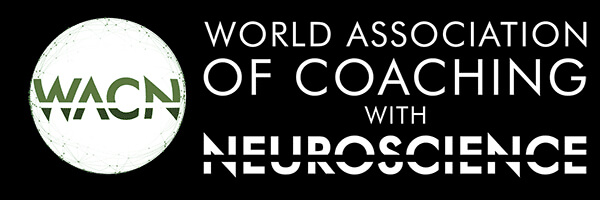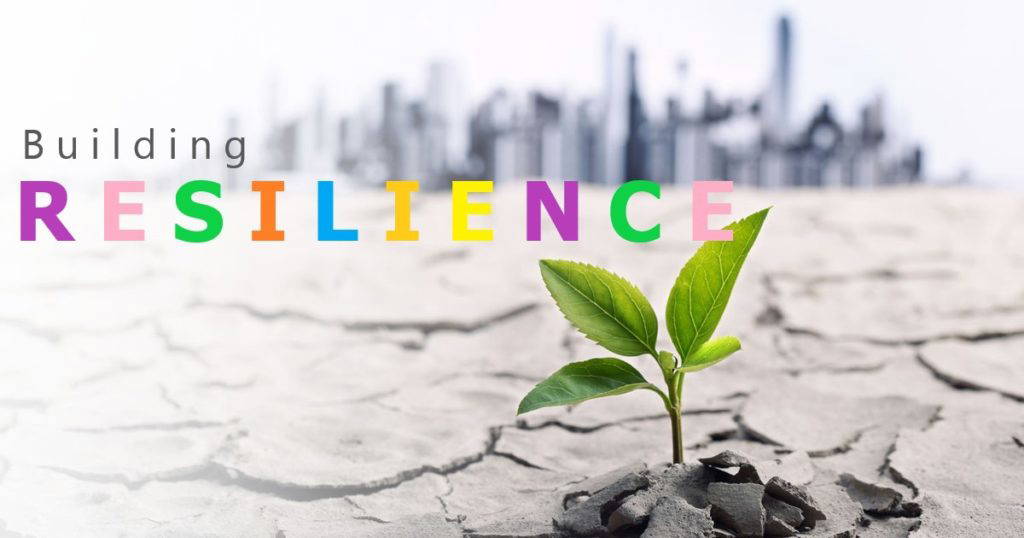
Who has been through a global pandemic before? The bottom line is none of us has! Hence, we need to give ourselves 'a break' on the days we are finding it challenging or simply where tiredness, stress, tensions, depression, anxiety, worry, or exhaustion has caught up with us. That, in itself, is the art and secret ingredient to honing our resilience – knowing when to 'stop', recharge our batteries, and recover. An empty sack can't stand up! As humans, we are all naturally 'resourceful and whole', we all have the power and ability to plant new seeds and emerge through the cracks that are appearing in life right now, for some more than others.
People's lives, livelihoods, daily lifestyles, and routines have been uprooted and disrupted in what still feels like a 'surreal bubble' as we bed into level five restrictions (highest restrictions in the Republic of Ireland) in the winter period. It is now a different 'ball game', as the last eight months have undoubtedly taken its toll on individuals, front line workers, the health care system, society, businesses, careers, and the economy across the globe where the 'goal posts keep moving position'. I urge you to reflect on this for a moment. Imagine a game of soccer where the goal posts keep moving on the pitch – planning and strategy tactics would take a hit, and the 'players' playbook would no longer be applicable'.
Players would get confused and frazzled with the level of chaos and lack of direction in terms of where to aim their focus. Naturally, their performance would be the first thing to suffer as stress chemicals flood their minds and bodies impacting their decision-making ability, coordination, and functionality.
What is happening with the impact of the pandemic isn't too far off this scenario – the goal posts keep shifting in terms of what level of our roadmap we are on and for how long. There are great levels of contagious uncertainty in the atmosphere, a sense of ‘unknown’ anticipation. It is causing people to feel off-focus and off-balance as people adjust and then re-adjust. People are trying to bridge the 'unsettlement gap' between the different transitioning phases. Depending on peoples' circumstances, some are struggling more than others. It will be experienced differently for everyone.
Outside of the pandemic and uncertainty of what Christmas will look like this year in terms of making home visits, we are in the season where quite often people that have normal mental health (neurotypical) throughout the year experience seasonal affective disorder (SAD). Lack of sunlight can cause a disruption in the biological clock (circadian rhythm), impacting a drop in serotonin levels, the brain chemical that affects mood and may trigger depression when low.
Symptoms can show up with low energy levels, trouble sleeping, overeating, lack of concentration, and in general, feeling moody, with patience and tolerance levels running low. It is a common occurrence for many people. You don't need to 'tough out' a dose of the 'winter-blues' on your own.
Should you recognise that you are experiencing some of the symptoms, reach out and tell someone how you feel. Take steps to give your mood and motivation a boost, and reflect on what self-care tips and strategies you can put in place for yourself.
A gentle reminder to everyone - for those that are important to you and perhaps you haven't been in touch with them for a while, drop them a little message to let them know you are thinking of them. Often people can simply be having an 'off day'. This small gesture and act of kindness can make the world of difference.
There isn't a manual on 'how to survive the pandemic' and remain hale and hearty in the process. A lot of people consider that they are 'working from home - WFH' when in fact, the reality is we are 'parenting from work - PFW', full-time or clock-watching for the school run drop-off and pick-ups. In saying this, I am incredibly grateful that I have a fully operational business working in the home environment, however it does require discipline, planning and organisation to make the work and home life merged into one space effective.
The avalanche of distractions and interruptions working in the home environment are snowballing for many, and impacting workflow and performance output. This is leading to people experiencing low self-esteem and productivity shame – feeling like they are 'never doing enough' with inner-critic self-talk exasperating rumination, where people feel like their jobs and work are somehow in jeopardy.
A recent article from Fidelity Investments in Boston revealed that according to statistics from the U.S. labour, show that nearly 80% of 1.1 million workers who dropped out of the workforce in September were women. It further revealed that 39% of women are actively considering leaving their jobs or reducing their hours due to increased remote schooling and caregiving responsibilities.
This research highlights the need for women in Ireland, and worldwide, to be proactive in negotiating flexible working arrangements with their organisations so that you don't feel pushed out. Flexible and supportive working arrangements would offset the spiralling decline in mental and emotional health to bridge the gap in these uncertain and financially strained times. Be it that you are an employee, or self-employed, you may wish to consider your personal performance strategy (upcoming tools supplied to enable peak performance skills) if you feel like you are spinning one too many plates.
Performance factors are not remotely confined to just those parenting from work – there are a host of factors impacting on peoples' performance. Individuals worrying about job security or trying to sustain peak pressures in challenging and demanding work environments are feeling isolated from team resources and expertise connectedness, are seeing a decline in motivation, self-belief, and confidence.
The scenarios above are only some of the multi-dimensional layers of distractions we have disrupting our daily workflow and PFW environments. Be it the winter-blues, work fatigue, the overall pandemic feeling with energy levels slumping, hanging in by a thread in a relationship, worried about your job security, financial stress, health concerns – whatever the challenge or worry is – lean in on support and talking it through with someone to gain clarity and perspective to navigate your way out of the fog is crucial to your mental and emotional wellness.
No different to when we are driving, and unsure how to reach our destination; we don't drive around aimlessly hoping to eventually find our destination – we use Google maps to ensure we are on the right path and arrive safely.
Untold stories can be a tremendous burden to carry, and can potentially lead you into a ruminating rabbit hole, trying to figure out solutions on your own. From my own experience, I know it is a very dark, lonely, uncertain and daunting place. Two brains are better than one to navigate through the fog. Worries and uncertainties are a temporary 'state of being' – of course, it may not feel like it if you are currently emerged in problems and struggling to keep your head above water. There are always answers, options, solutions, and brighter times ahead – you accelerate that process when you reach out and ask for help. I advocate you not to let pride or ego get in the way of that, otherwise muddling through on your own takes longer to get there.

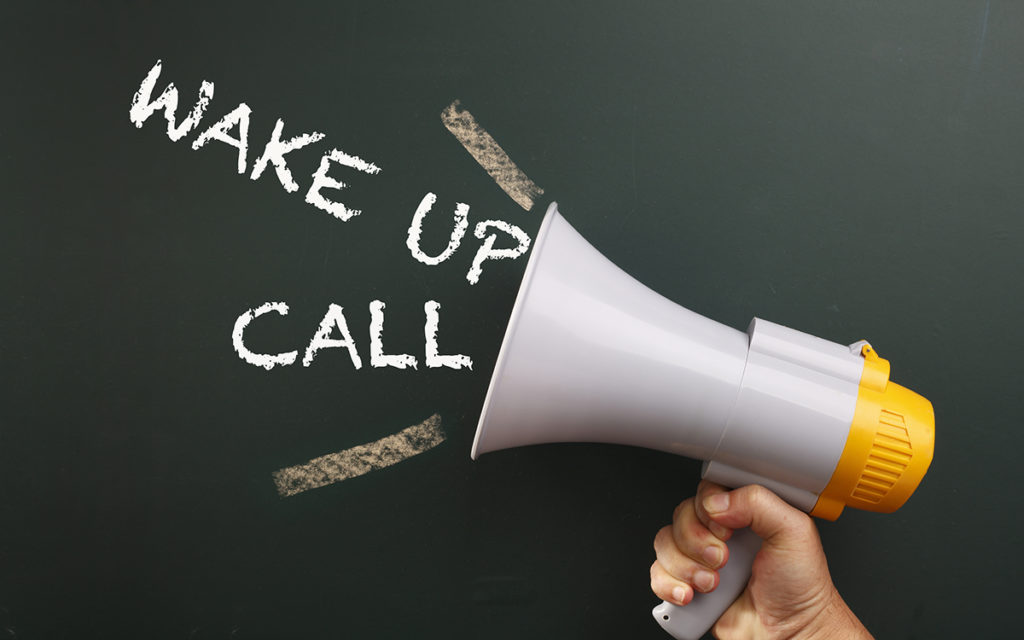
People facing job losses and isolation were cited at the recent Mental Health and Well-being Summit virtual event I attended on 13 October as the two most significant factors contributing to suicide rates escalating. Outside of suicide, depression, stress, and anxiety are on the rise exponentially.
In 2019, the World Health Organisation declared burnout as an official medical diagnosis, proving that burnout is genuinely a problem that plagues modern workers. Now, if we fast track to November 2020 as we continue to transition through an ongoing pandemic, we have a reality check in terms of where many employees are at.
A recent survey carried out by the Department of Work and Employment Studies at the University of Limerick's Kemmy Business School, on behalf of OMT Global revealed that 60% of employees in Ireland are feeling more stressed since the onset of Covid-19, with 67% of women reporting increased levels of stress compared with 45% of men.
More than ever, it makes sense to harness our ability to lean into our 'levels of resilience and resourcefulness' to protect our mental, emotional, and physical health. Saturday 10 October was Mental Health Day – awareness is continuously being raised in the news, social media, etc., but what are we actively doing about it? How are 'you' actively taking responsibility for your daily wellness, and at what level? An odd detox day or a marathon sleep session in bed to recover from workload exhaustion are unfortunately only temporary quick fixes and sticking a band-aid on the problem.
Our daily wellness, ability to maintain well-established routines and self-care, play a crucial part in nurturing our coping skills, and performance output to enable sustainable resilient biological mechanisms. Be it that you have veered off track, or finding that 'where you are at now' is challenging to sustain, and you wish to ensure you stay on track, then I do wholeheartedly encourage you to stay reading.

I am inviting you to keep an open mind and connect with what I am sharing with you. Be curious to discover how this 'article' can equip you with the 'mind tools and coping mechanisms', enabling you to last the pace during the pandemic. This article will lead you on a journey to emerge with new levels of resourcefulness, wellness, and performance sustainability to bridge to your success in terms of what you wish to achieve in the various aspects of your life personally and professionally.
The medical definition of resilience is 1) the capability of a strained body to recover its size and shape after deformation caused especially by compressive stress 2) an ability to recover from or adjust easily to misfortune or change – i.e. emotional resilience.
Resiliency can in fact be described as a 'state or the quality of being resilient'. Our body and mind and operating systems within it, is our ecology and how we adapt to our environments (environmental science). No different to looking at our external environments and how they have been disrupted and uprooted during the pandemic, we need the skills to balance our own internal ecosystem to align with adaption strategies. In plain English – we need to start listening to our bodies and paying attention to stress signals, the warning signs and where they are coming from in our bodies.
You may wish to take a reflective look at the following image and review what is currently showing up for you in terms of the four dimensions – body, mind, emotions, and behaviour. It helps when we breakdown the process to understand, notice and capture stress signals and the early warning signs, so that we can intercept them and get ahead of them. It is an opportunity to understand how the pandemic is potentially impacting your daily wellness.
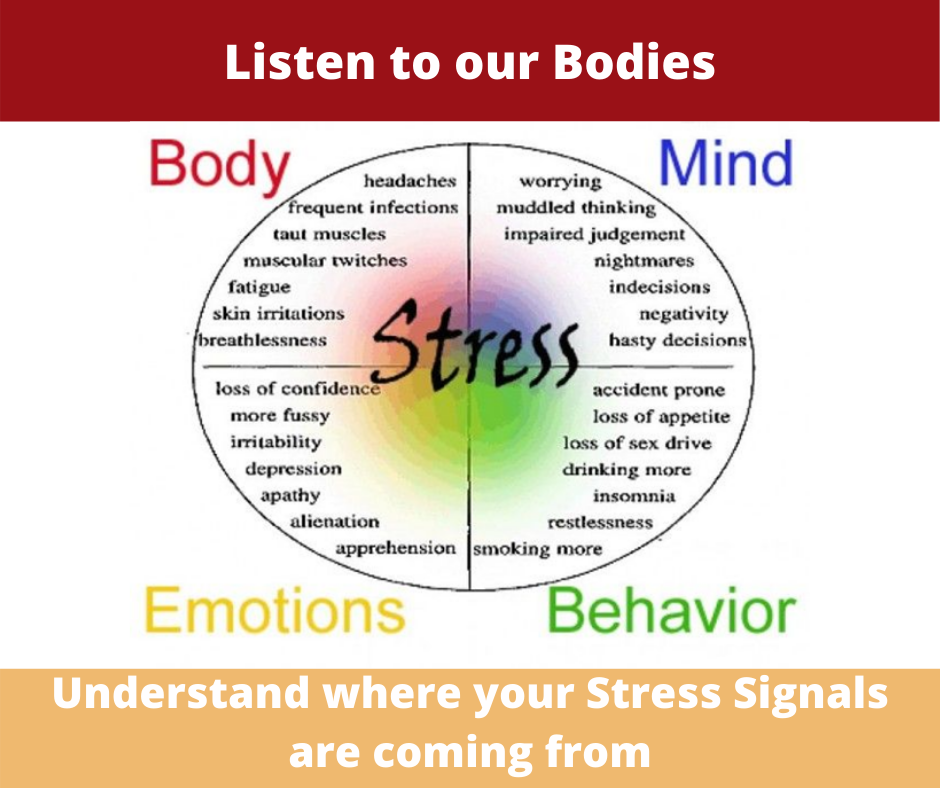
Balancing our ecosystem (mind and body) is crucial in terms of our self-regulation and self-management to off-set against the new peak pressures we are experiencing to support congruency and balance alignment in our 'state of being' and how we show-up daily. A host of skills are required to enable us to consistently know how we return ourselves to our natural state of equilibrium as opposed to letting our stress neural network pathways run. Our natural equilibrium enables us to feel and experience a sense of groundedness and calm, it supports our ability to connect with others and operate from our executive brain function.
When we invest in our daily self-care, in terms of our lifestyle choices, we increase our levels of wellness and robustness. Outside of nutrition and exercise, getting a good eight hours sleep is paramount to our cognitive, emotional, and behavioural wellness and functionality. The brain has a recovery neuroprotective process that occurs when we get the right amount of sleep. Should you be feeling off-track at the moment, the starting point and road to recovery and wellness is ensuring you prioritise consistent sleep habits to get back on track.
Prioritising our wellness goes hand in hand with building our resilience to show up consistently and productively in our daily lives. For those times, when we do experience knocks or challenges, we have the coping mechanisms to recover mentally, emotionally, and physically to get back on track faster. To enable this process, you may be interested in a tool I have created – ‘Adapting with Sustainability – Behaviour and Habit Investment Plan’ in my e-book Overcoming Resistance to Change.
Thanks to our understanding of neuroplasticity – which tells us that our brain remains flexible like plastic and has the ability to change, give us the evidence that we can redirect our mindset and focus by shifting our thinking patterns as our brain is in a constant state of flux with every thought we churn out. With new thinking skills, we have the ability to make that change happen. To quote Ruby Wax, "Finding out about neuroplasticity, discovering that I can revamp my inherited neural wiring and rewire it for a better life was the greatest news I've ever received".
We can't use 'age' as an excuse either that we are 'too old or stuck in our ways', to make change happen - neurogenesis is the process by which new neurons (brain cells) are created. It is responsible for populating the growing brain – a process that thankfully continues throughout our life span.
In a nutshell – what the above is telling us is we have the ability to unlock new resources in ourselves. To put this in context, how many times have we seen people full of enthusiasm at the start of a new year with new year's resolutions that fall flat a couple of weeks or so into the process? People do not intentionally fail on purpose – the challenge is people are using the same recycled autopilot thinking to achieve something they had already tried before and failed. The autopilot thinking is fuelled by subconscious memories and experiences that confirm this past failure. To quote Albert Einstein "We cannot solve our problems with the same thinking we used to create them".

This is where in my capacity as a Neuro Wellness (stress management) and Emotional Intelligence coach comes into play – where I enable people with the skills, tools, and techniques on how to create new thinking. New thinking skills on their own will not achieve our desired results, naturally, the new thinking skills need to be put into consistent action to enable breakthroughs. To create the transition in our mindset from 'old thinking to new thinking', I have created the SHIFT model.
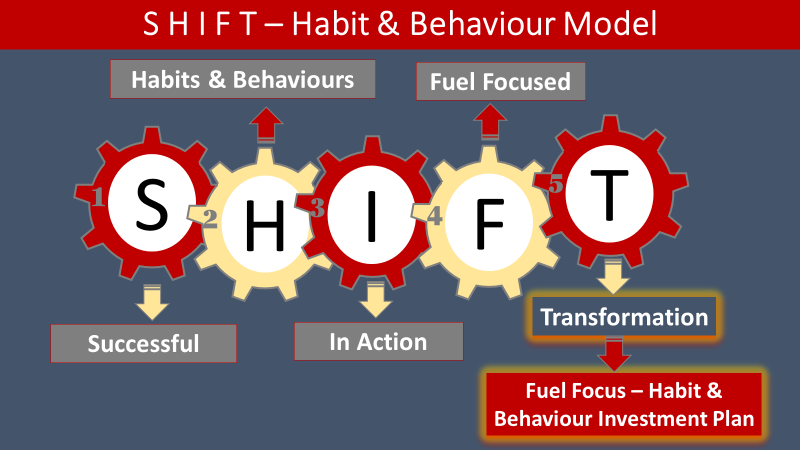
To fully appreciate how the SHIFT model works; it is available in my e-book, Unlock the Secrets to Boosting Productivity, where I share mindset insights, tools, and resources to support applying the learning into your daily lives enabling wellness and performance success.
To drown out daily distractions and fuel focus, check out the 'Fuel Focus – Habit and Behaviour Investment Plan' Tool, which accompanies the e-book. It elevates conscious self-awareness, providing a fresh thinking process designed to overcome daily distraction stressors and triggers, enabling consistency to boost daily productivity. My methodologies take a systematic and heuristic approach with the opportunity to reflect and evaluate ongoing progress, transitioning to sticking transformation, bridging to achieving sustainability success.
For me personally, I would describe myself as someone that has had 'more knocks in life than hot dinners'. Well before the pandemic came along, I have had to get back on my feet on numerous occasions after setbacks and extenuating circumstances. The details aren't important.
What is important is that I know I am not remotely defined by tough and extenuating circumstances that are now in my history, in my past tense. I have zero violins playing for myself, no blame game, no resentment, instead quite the contrary as it happens.
I give an abundance of thanks for all the learning, insights, and experience of where my journey has brought me to date. Without it, I wouldn't be where I am now – immensely enjoying and engaged in the life and career I have created for myself that I am evolving in. It is not all care bears and rainbows, there is hard work and phenomenal effort involved. However, with it comes a life full of 'meaning and purpose' with positive goals to work towards while acknowledging and banking incremental success along the way.
My mindset, focus and energy are operating from my 'present tense' with a 'feed-forward' attitude. If I hadn't learned to make that 'mindset shift' for myself, well the alternative would have been a very bleak, dismal soul-destroying story. A story that would have involved me staying stuck and incredibly unhappy.
I am not remotely special here, and I am undoubtedly not on my own, so many of us have had to overcome adversity and build resiliency muscles. When we can find it in our hearts to let go of our past tense and overcome adversity, it loses its power and grip on us. We reach a level of acceptance and peace of mind that frees up and creates spaciousness to work and focus on a brand-new chapter in our lives.
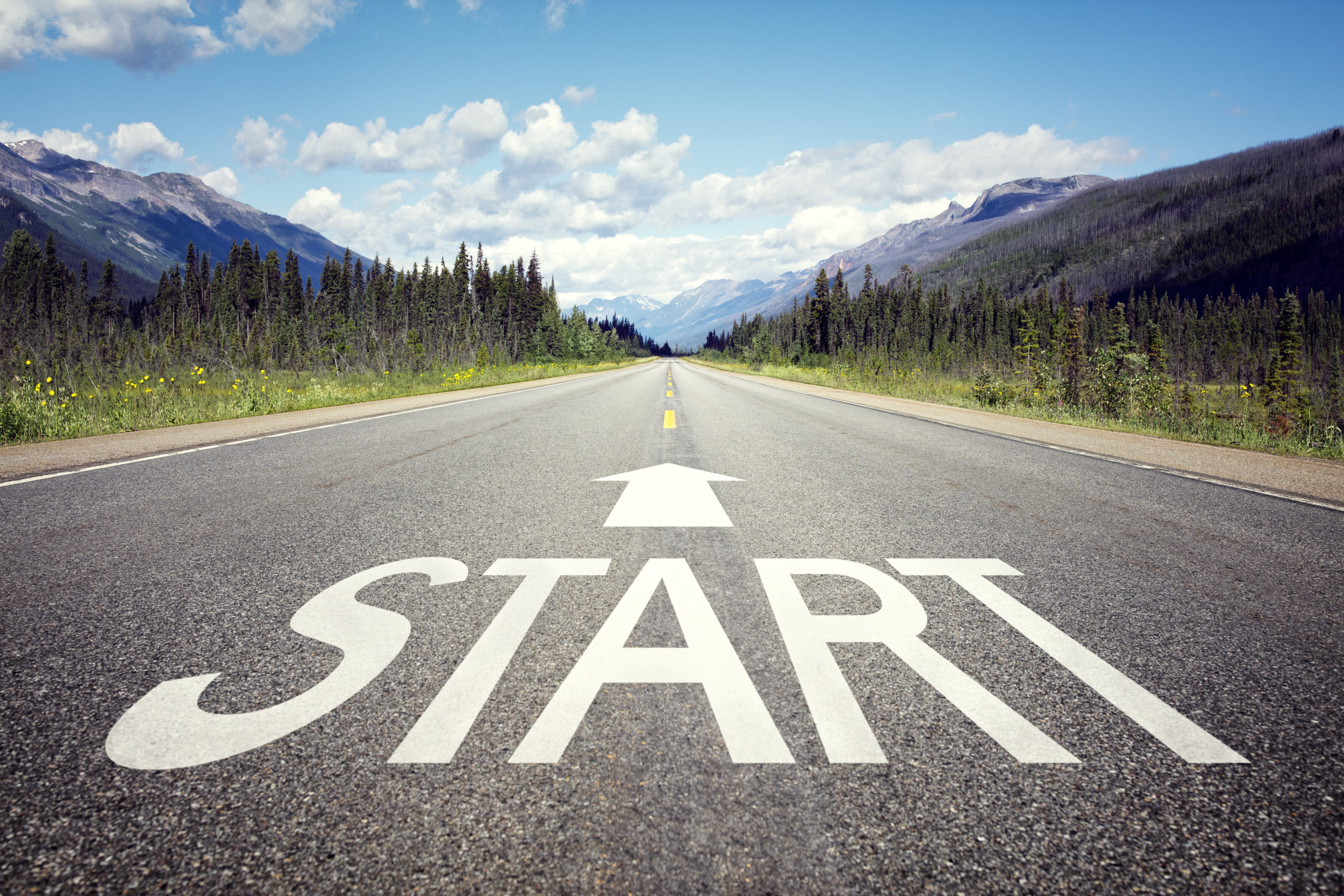
No matter what uncertainly, doubts and concerns have crept in for me during the pandemic as I launched my business in the middle of the chaos, there are a few fundamental factors that are fuelling my never-ending optimism, which by the way gets tested the same as everyone else. It is worth mentioning 'optimism' is one of 15 key emotional intelligence skills and is highly learnable.
Not losing sight of my 'why', 'purpose' and 'vision' has been crucial to enabling my mindset, self-belief, and values system, which makes up some of the ingredients embodied in my intrinsic ecosystem management. My ‘why’, ‘purpose’ and ‘vision’ not only anchors and ground me, they act as a constant source of focus, strength, and resilience. Yes, we need planning. Yes, we need preparation. Yes, we need a strategy. With the nature of the pandemic and the goal posts that keep shifting, not losing sight of our ‘why’, ‘purpose’ and ‘vision’ are the core foundations that will act as internal drivers and motivators when we hit speed bumps along the way.
Changing my business strategy and having the flexibility to manoeuvre and adjust within the experiential process of trying things out, seeing what works, what doesn't work, and bringing the learning forward to the next stage is all part of the evolving journey of growth and bridging to success.
Leaning in on networks and areas of expertise from others, and staying connected with new communities is vital to our survival. To mention just one of these - which is growing from strength to strength, Ireland Together - a non-profit organisation that helps and supports SMEs, that emerged virtually during the onset of the pandemic is such a rewarding and privileging experience to collaborate and share in.
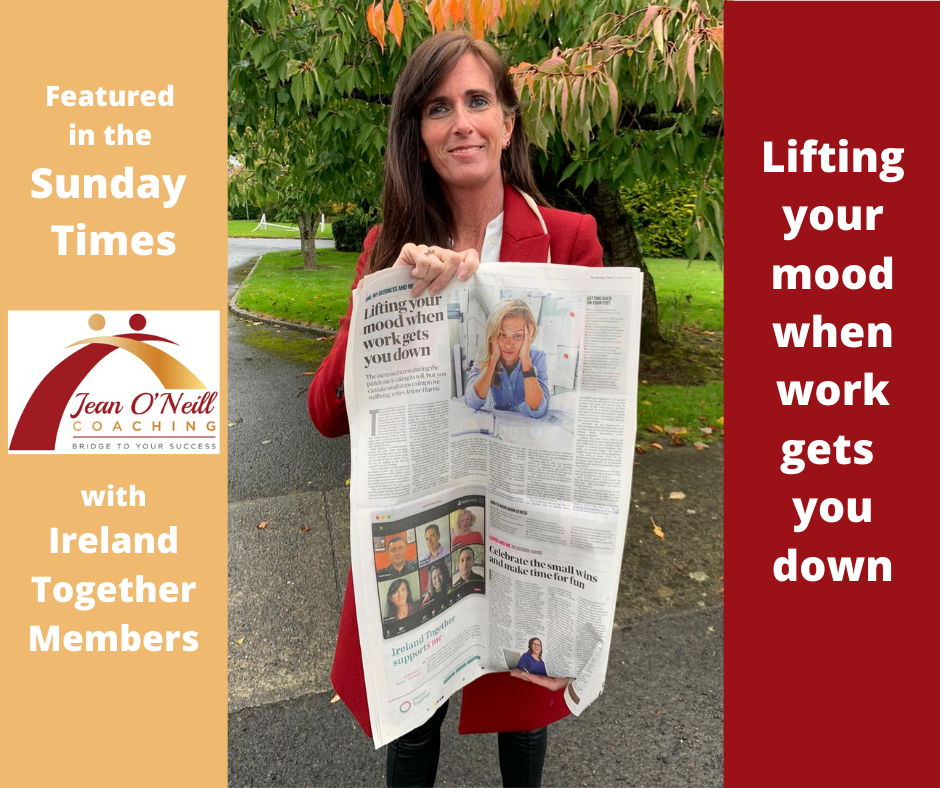
If I was to add two things to the above, practising gratitude daily, which neuroscience tells us is an empowering positive emotion, is one of my bedrocks. It enables me to show-up daily, in what I can best describe as having 'inner heart', in turn, this emits from my well-meaning energy when connecting with others. The other is, of course, my daily self-care rituals and adjusting them depending on what crops up in my day – unexpected and unforeseen things crop up the whole time – it is the nature of our daily busy lives.
From the onset of the pandemic, I was incredibly concerned about how 'stress and anxiety' levels were going to rise with the new peak pressures and adversity being experienced for people. As a result of that, I wrote two e-books, which I have previously mentioned in the article:
Both e-books are accompanied with downloadable tools. The tools enable the insights from the e-books to be applied directly into your life. The tools are geared at supporting adaptability and sustainability skills, enabling new levels of resourcefulness, growth mindset, stress management skills, wellness and self-care strategies, goal setting and enhancing your performance and coping mechanisms.
I am delighted to make my e-books and tools available complimentary to you. My wish is to support your ongoing journey of resilience and sustainability to bridge to your wellness and career success in times of unprecedented change with optimism, hope and courage in your heart.
Jean O'Neill Coaching – Master Coach with Neuroscience
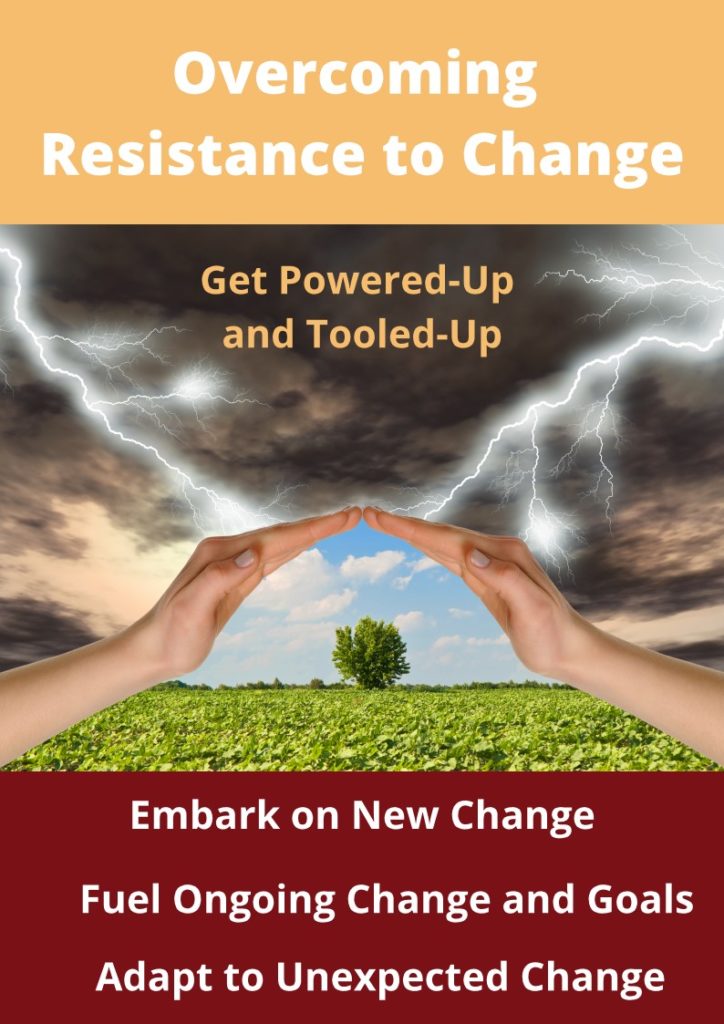
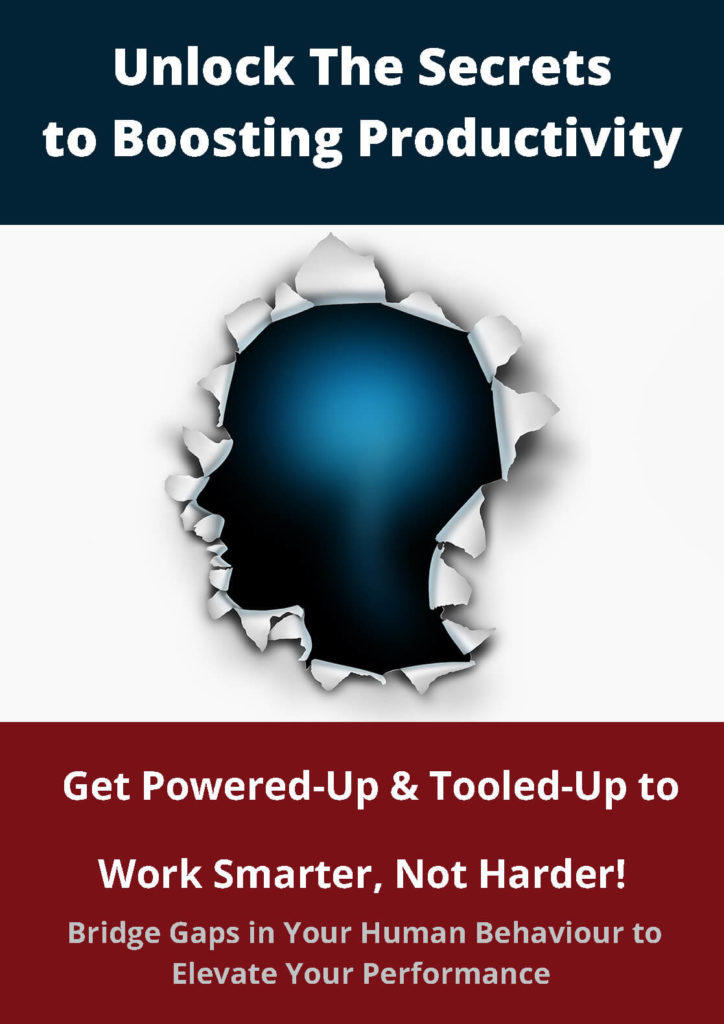
https://www.jeanoneillcoaching.ie/e-books/
Enter the code (s) in the payment option to avail of the e-books and tools.



